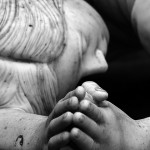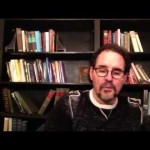We run our website the way we wished the whole internet worked: we provide high quality original content with no ads. We are funded solely by your direct support. Please consider supporting this project.

The (Spiritual) War on Terror
Jesus’ ministry was a ministry not of resignation but of revolt. He was about revolting against the cruel tyranny of a world ruler (Satan) that was oppressing God’s people. He was about seeking to give back to people, and to win back for his Father, what the enemy had stolen and destroyed. He was about restoring humanity to its rightful place of dominion over the earth, and thus about empowering humans to rise up against the cosmic thief who had stolen this from them.
Jesus’ very being, and certainly his deeds and his teaching, were about training us to revolt against the enemy in order to make our circumstances a place where we can discern the hand of God. From this perspective, we must never pray to accept “as from the father’s loving hand” any evil event.
We ought rather to pray to change things. Many think that the purpose of prayer is not to change God or to change things but only to change us. And while it sounds pious, it’s altogether unscriptural.
The primary purpose of prayer, as illustrated throughout Scripture, is precisely to change the way things are. Crucial matters, including much of God’s own activity, are contingent upon our prayer.
The prayer of the righteous is powerful and effective (James 5:15-16). Whether we pray, how faith-filled our prayer is, how persistent it is and even how many people agree together in prayer are all factors that have a real effect in getting God to move and thus in changing the world. Jesus attached real urgency to prayer (see Lk 11:5-13; 18:1-8) and believers are therefore to strive to be involved in it on a nonstop basis (1 Thess 5:17).
According to Scripture, prayer can save a nation (Ex 32;10-14), and the lack of prayer can destroy it (Ezek 22:30). Faith-filled prayer moves God to bless, and the lack of prayer hinders it (2 Chron 30:18-20; Lk 18:1-8). Faith-filled prayer empowers one to free other people from demons, while the lack of faith-filled prayer leaves these very people enslaved.
In the midst of the spiritual war, things genuinely hang upon what free, morally responsible beings do or do not do. To expand God’s kingdom is to revolt against the kingdom of evil and the main thing that we do, as Jesus both teaches and demonstrates, is to exercise prayer and faith. When disciples do this, no demonic obstacle to the kingdom, however formidable, can stand in their way (Mt 21:21-22).
—Adapted from God at War, 201-205
Image by _Pek_ via Flickr.
Category: General
Tags: Open Theism, Prayer, Warfare Worldview
Related Reading

Theo Graff Podcast: Featuring Jessica Kelley
We have a special treat for you today. T. C. Moore is a great friend of ReKnew and he’s recently started a “Jesus-centered, hip hop flavored, geeky, theological, kingdom exploration” called the THEO GRAFF PODCAST. He’s published four podcasts so far and you’ll want to listen to them all when you get a chance, but we wanted…

What is the significance of 2 Samuel 24:12–16?
The Lord gives David three options of how Israel will be judged. “Three things I offer you; choose one of them, and I will do it to you.” This verse reveals how the Lord gives people genuine alternatives and responds to their choices. If God foreknew what David would choose, however, the purpose of the…

What is the significance of Ezekiel 22:29–31?
The Lord says he “sought for” someone to stand in the breech for Israel “but I found none.” Hence Israel experienced the wrath of God. If everything that shall ever come to pass is eternally fixed in the divine mind, God would have foreknown that no one would respond to his call for a Moses-like…

Why Prayer Matters
Two questions about prayer: What possible difference can prayer make to an all-good and all-powerful God? Why would an all-wise God leverage so much of his will being done on earth on whether or not his people talk to him? These questions began to be resolved for me when I began to think about prayer…

What is the significance of Numbers 14:12–20?
In response to Israel’s bickering the Lord says “I will strike them with pestilence and disinherit them, and I will make of you [Moses] a nation greater and mightier than they” (vs. 12). Moses asks the Lord to forgive the people, and the Lord eventually responds, “I do forgive, just as you have asked” (vs.…

Free Will: Is it a coherent concept?
Greg is going to be spending the next several blogs talking about the idea of free will. In this first reflection, he discusses whether it is coherent to speak of a decision that is not determined or exhaustively caused.
